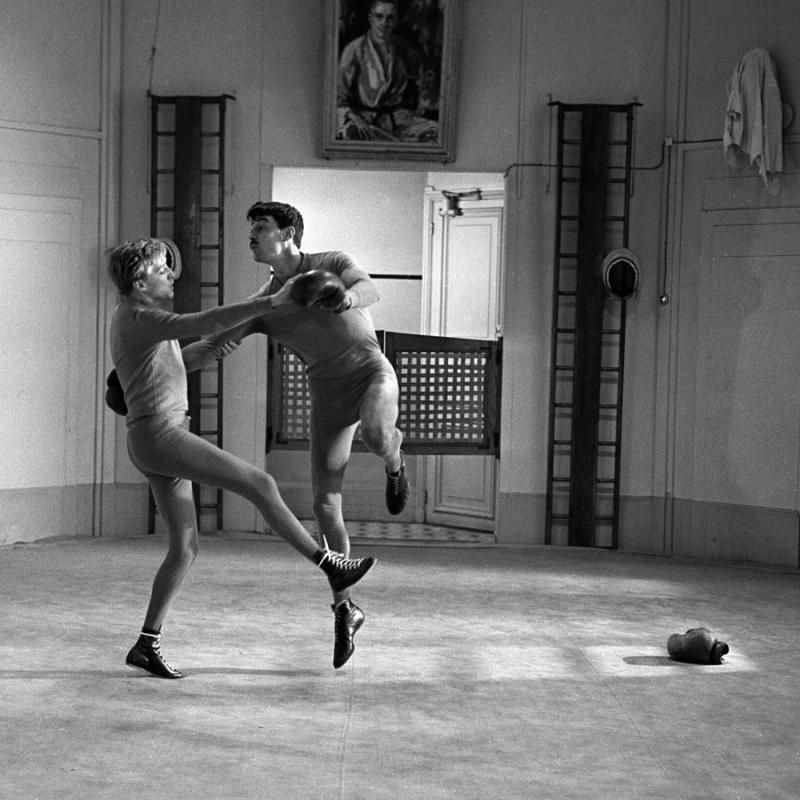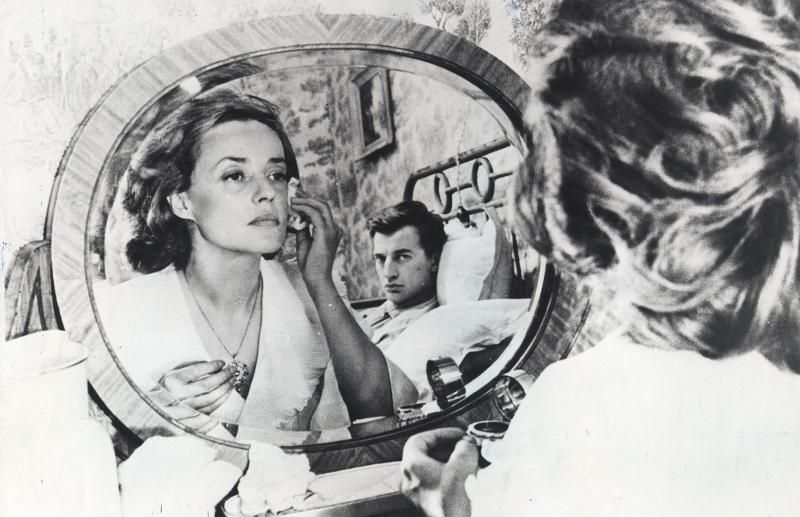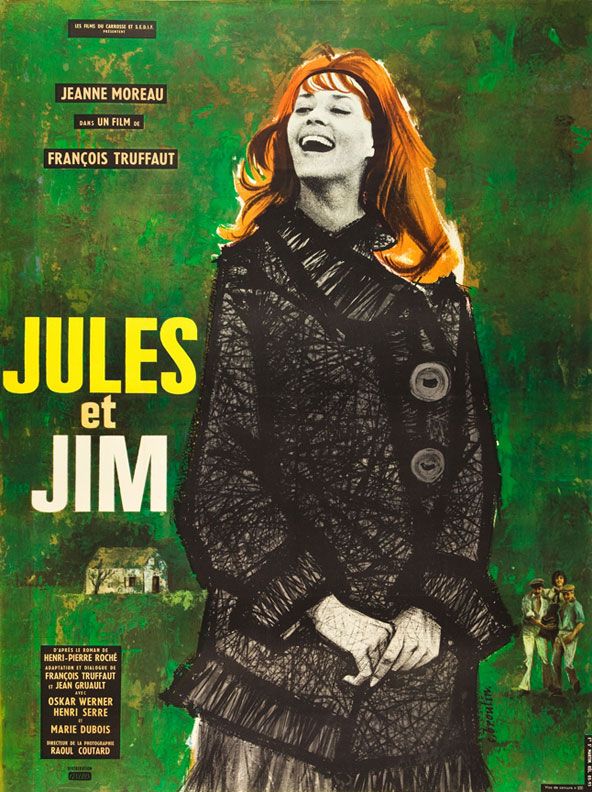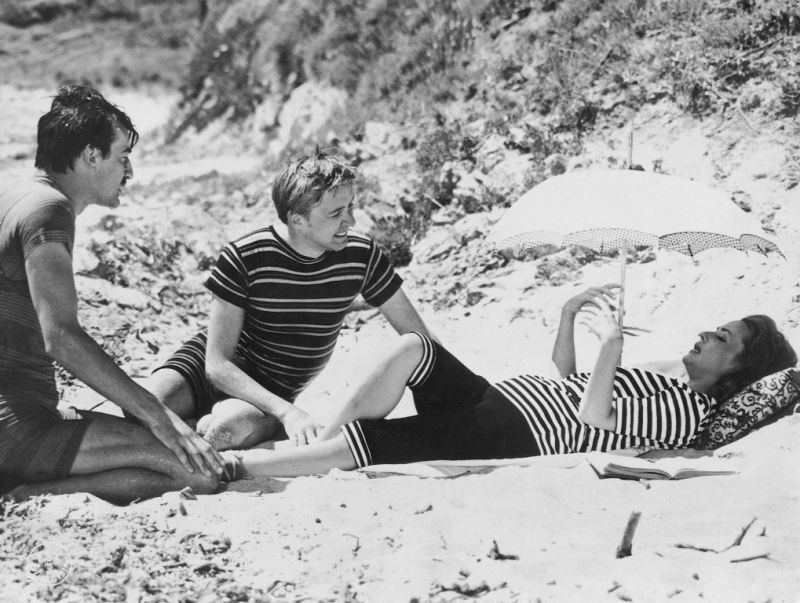Jules
et Jim
1962
Director: Francois Truffaut
Starring: Jeanne Moreau, Oskar Werner,
Henri Serre
I
will now pull out what is to become my Standard French New Wave Introduction:
Just because I can appreciate, objectively, how the films of the French New
Wave advanced filmmaking in the sixties doesn’t mean I have to like the films
themselves. Because I don’t. In my revisit of Jules et Jim, I remember
vaguely having some affection for the film, but that affection began
dissipating around the halfway mark of the film. In a movie so much about three central
characters, it is extraordinarily hard to like the movie if you cannot like
said characters, a fact that’s even more grating when it’s incredibly apparent
that I am *supposed* to like these three people.
In
1912 Paris, Jules (Werner), an Austrian, befriends Jim (Serre), a
Frenchman. The two form a fast bond and
live a bohemian lifestyle together.
Enter Catherine (Moreau), the one woman who captivates Jules in a way
the other Parisian women cannot. But she
captivates Jim as well. As the years
pass, Jim and Jules fight in World War I, Jules marries Catherine and has a
daughter with her, but Catherine bores of their marriage and takes on many
lovers, including Jim. Her
capriciousness and insatiability, however, cannot be contained.
Although
it’s now been over a decade, I was reminded of reading and discussing D.H.
Lawrence’s Women In Love in my freshman year of college while I was
recently revisiting Jules et Jim. The two
share many thematic elements: complicated love affairs and strong male
friendships are obvious, but also a sense of vast discontent with the world at
large for pretty much all the characters.
They speak of true love and passions but with emptiness and spite, and
view almost everyone else beside themselves as lesser beings whose feelings are
not potent enough to matter. And I had a
very similar reaction to Women In Love as Jules et Jim. These people are rather full of themselves
and have an extraordinarily distorted bohemian sense of superiority that
appears to be actively preventing them from being happy.
And
that’s really my major reaction to the triangle of Jules, Jim, and
Catherine. These are people so utterly
narcissistic they cannot ever be happy.
Jules is weak and so besotted with Catherine that he completely
prostrates himself at her feet, letting her walk all over him and uselessly
basing his own happiness off the scraps of attention she deigns give him. Jim seems to be stronger than that, but he
constantly vacillates back and forth between cutting himself free of his toxic
attraction to Catherine and making a real life with someone else. His inability to escape Catherine is
frustrating to the last. And then
there’s Catherine herself, the instigator in all this mess. Jules and Jim have a pretty decent bromance
going until Catherine comes along and mucks everything up with her crazy
ways. Seriously, she’s crazy. Initially, when we first meet everyone and
they are young, her craziness – like jumping in the Seine on a lark – is passed
off as a “wild and crazy” youth. OK,
sure, I completely understand the need, when one is young, to act out and do
ridiculous things. The problem is,
Catherine never gets any better. She
never grows out of this and slowly eats away at Jules and Jim both with her
dangerous impetuousness. Even when she
becomes a mother, she never acts like one.
I can understand that not all women are blessed with maternal instincts,
but Catherine takes it too far.
 |
| Look at them... they were so happy before Catherine came along... |
The
thing that bugs me the most about Catherine is that Truffaut essentially
considered her “his ideal woman.”
How? Why? Because she’s a trifling narcissist who bends
everyone around to her petty whims? Is
that REALLY your idea of an ideal woman, Truffaut? I understand that Jeanne Moreau is beguiling
and certainly has charisma, but Catherine is morally repugnant. I like that Catherine is strong-willed, but
she’s not strong-willed in a good way. I
guess I must simply arrive at the conclusion that my idea of an ideal woman
differs greatly from Truffaut’s.
In
terms of the filmmaking itself, well at least it’s Truffaut, and Truffaut is
easy to swallow. Despite the rather
ridiculous characters, we get some playing around as is the New Wave style. A narrator is constantly telling us things
both vital and unnecessary to the central story. Truffaut underlines a point by randomly
adding in subtitles in one scene, and he uses some stock footage of both
Victorian prostitutes and Nazi book burnings at different points in the
film. It’s interesting, here, that we
have essentially a French New Wave period piece, and the costumes of the 1910s,
20s, and 30s seem somewhat incongruous with the thoroughly modern techniques championed
by Truffaut’s New Wave, but it certainly sets the film apart from its
contemporaries.
 |
| "Hold on honey, let me clean my face before I ruin your life." |
Unlike
Truffaut or so many other critics, I never fell in love with any of the main
characters. I never found their
struggles to keep themselves consistently unhappy and beaten down appealing
(because really, that’s how they were behaving to me). I do not see their story as romantic or
charming at all, but one full of viciousness and toxicity. And Jules et Jim is very much based on
its characters. Poor Jules and Jim,
neither strong enough to know when to let go of the crazy bitch.
Arbitrary
Rating: 4/10. If Catherine is a manic
pixie dream girl, then I don’t understand men.
Heck, I liked Godard’s wacko crazy Weekend more than this!!!


I saw this last month and I felt it was just okay. And that was for the "bromance" part more than anything else. Those two should have just set up housekeeping together and forgotten about her. I agree that she is unlikable. Don't judge all men on the whims of a single French director who was apparently fucked in the head.
ReplyDeleteBy the way, I just saw the British film Darling (1965) earlier today. Pretty much everything you wrote about the female character in Jules and Jim you could write about Julie Christie's character in Darling. The world is there to cater to her.
Yeah, I'm of the same mind - Jules and Jim by themselves were great, a funny little early twentieth century male friendship. But add Catherine into the mix, and everything just gets all crazy mixed up and nauseating.
DeleteI won't judge all men! But I honestly cannot, for the LIFE of me, understand how Catherine could be ANYONE's idea of a "perfect woman." Bitch be crazy.
I'll steer clear of Darling, then. Yech.
I disliked this film for the same reason as you. She's one of the most selfish, arrogant, and frustrating film characters ever. I just don't get how she's appealing.
ReplyDeleteEVERYTHING I read about Jules and Jim, from critic reviews to the accompanying essay in the Criterion DVD set, was going on and on about how Catherine is "the perfect woman," or at least Truffaut's ideal. What the hell. I don't understand that in the slightest.
DeleteI guess I don't have a real problem with unlikeable characters in film, but I have a BIG problem with unlikeable characters who aren't supposed to be unlikeable. It would be one thing if Jules et Jim vilified Catherine, but quite the opposite. It puts her on a pedestal. I am supposed to revere this character for jumping in a river and being horrible? NO.
I haven't seen this film in years. I think I liked it a bit more than you but, now that you point it out, Catherine is pretty horrible.
ReplyDeleteY'know, Marie, the first time I watched it about five or six years ago, I remember vaguely liking it. Not loving it, but, as I mentioned, having some vague sense of affection for it. So I was actually looking forward to watching it again. However, I was much less impressed in this second pass. I'm a huge proponent of giving films a second viewing before making up my mind, but usually it serves to help me like the film MORE, not less! I think this is the first time I've liked a film substantially less in my second viewing, at least to this extent. Ah well.
Deletejordans
ReplyDeletelebron 16
jordan retro
nike react
kyrie 6 shoes
yeezy boost
supreme clothing
off white shoes
vans shoes
supreme clothing
you can check here weblink web Ysl replica handbags article high quality designer replica
ReplyDeletelike this cheap designer bags replica resource dolabuy louis vuitton link YSL Dolabuy
ReplyDelete